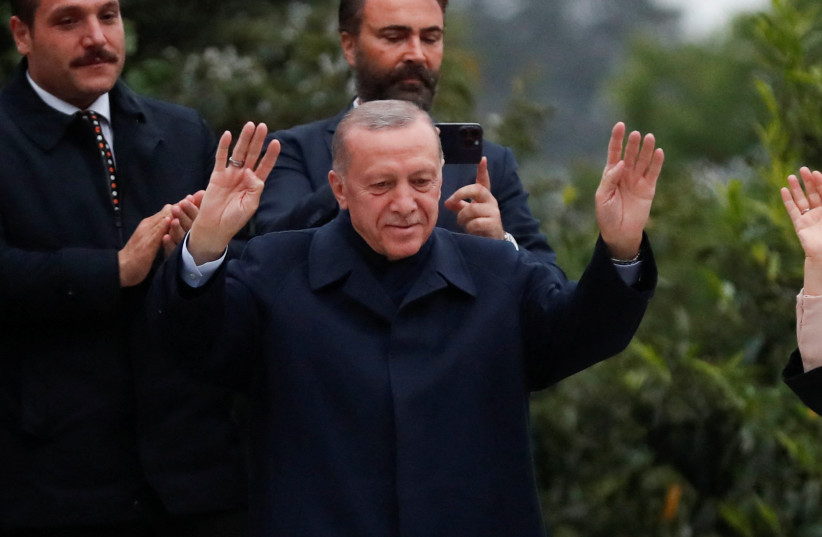With Turkey’s elections now decided and the unsurprising victory of the long-time ruling AKP Party and its leader, Recep Tayyip Erdogan, Israel will once again be dealing with the same government in Ankara as it has in the past. Turkey and Israel reconciled relations over the last two years, and an acrimonious era of tensions between 2009 and 2020 has shifted rapidly to bring closer ties.
These ties may be close only on the surface, however, because significant challenges remain, and Ankara’s media often hint at conspiracies and other scandals that could upset the apple cart. Israel’s leadership today is also cautious and not prone to naïve thinking. It understands Israel’s growing power and position.
Both Israel and Turkey are growing in their strategic power, and they recognize how this new politics, which is not just post-Cold War but also part of a shifting world order, works.
The outcome of the Turkish election isn’t a major surprise in Israel. Israeli politics also has had its moments over the last decade and a half, when it appeared that a large coalition of centrist, left- and right-wing parties might push longtime leader Benjamin Netanyahu aside.
While it’s true that Netanyahu did leave office in May 2021 after a large coalition barely managed to come together to unseat him, the overall trend is that Netanyahu rules a center-right political bloc that is not likely to quickly change.

The multilayered tensions between Israel and Turkey
Turkey and Israel are not similar, but there are commonalities between the historic trajectories of the countries. Among these trajectories is that early Zionist leaders such as David Ben-Gurion and Yitzhak Ben-Zvi studied in Istanbul in the early 20th century. There they saw firsthand the modern Turkish nationalist movement, which has commonalities with Zionism.
It’s not a surprise that Turkey was one of the early Muslim countries to have ties to Israel after 1948. Those ties generally improved through the late 1990s, when they reached a peak. The last two decades, however, have seen more tensions and controversies.
The tensions between Israel and Ankara are multilayered. Ankara’s ruling party is rooted in political Islamic values. It not only seeks a greater role in the Muslim world but also wants to champion causes it thinks are popular with the Arab and Muslim world. Toward that end, it has backed Hamas in the past and hosted Hamas leaders.
But it wasn’t always this way. Ankara wanted to play a once-upon-a-time role in the PA-Israel peace process and even peace between Israel and Syria. Those days of “zero problems” are now gone, and Ankara has spent several years, primarily during the Trump administration, cooking up crises with various countries, including Israel, Greece, the Gulf, the US, EU and others.
Today, the political winds are shifting. The Middle East is reconciling. Diplomacy is the new norm, and countries such as Saudi Arabia are now working with Iran and Syria. Ankara’s politics of stoking tensions and then climbing down and asserting that tensions lead to respect may be out of step with the modern Middle East.
They were a symptom of an era when the US appeared to be declining, and Ankara wanted a more robust strategic policy by which it would try to play Moscow off against Washington and work with Iran and other states, such as China.
Today, Ankara appears more confident that its policies have achieved the success and respect it wants. What that may mean is that Turkey and Israel can achieve a modus vivendi, where neither the Netanyahu or Erdogan governments share values or necessarily agree, but they can maneuver with less controversy than in the past.
It’s important to understand how the relations with the West play into this. Turkey has sabotaged its relationship with Washington through attacks on the US-backed SDF, acquiring Russia’s S-400 anti-missile system and generally threatening the US often. Western countries pay lip service, pretending to congratulate Erdogan on his victory, but mostly because they don’t want more problems amid the Ukraine war and tensions with China and Russia.
Ankara assumes that the West is declining and that the world is becoming multipolar, with US hegemony evaporating. Ankara shares this view with Russia, China, Pakistan and Iran. Israel does not share this view, but it is aware of how shifting power structures force countries to make complex decisions, such as Riyadh reconciling with Tehran.
During the Trump era, Ankara exploited close ties to Washington, and a sense that the US was isolationist, to create a host of tensions, including authoritarianism at home and a referendum to empower the president, invasions of Afrin and other parts of northern Syria, and greater involvement in Libya, parts of Africa and the Caucasus.
Bizarrely, the Trump era led to Ankara hosting Hamas more, whereas one might have assumed that a pro-Israel administration in the US that was also close to Ankara could have gotten the red carpet pulled from Hamas. Instead, Ankara shifted its language when Biden came into office, suddenly preferring reconciliation, with the hope that ties with Israel might help in Washington.
Now, this comes full circle. The US has an election cycle next year. Netanyahu looks firmly in power. Erdogan looks firmly in power for the next half decade. Much can change in five years. Ankara will want to push forward with those changes, such as investments in its arms industry and perhaps reconciling with the Syrian regime.
Time will tell whether the current “no tensions but not warmth” relations with Ankara continues, or whether Turkey hopes to benefit by creating a crisis with Israel. This could boil down to what happens in the Gaza Strip and the West Bank and other unforeseen developments.
For now, the general trend toward diplomacy in the region mitigates against a downturn in ties. There is not much wind in the sails of any public upturn in ties either, however, because neither Netanyahu nor Erdogan is likely to benefit from any kind of public embrace.
